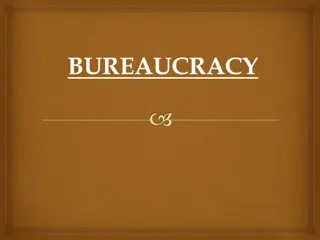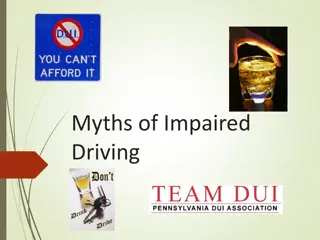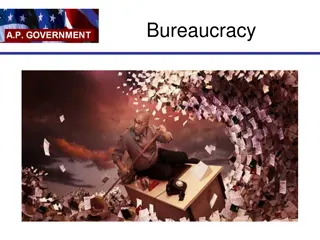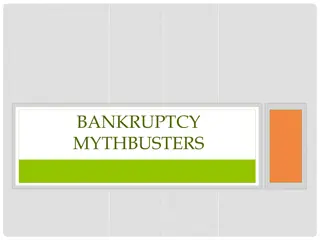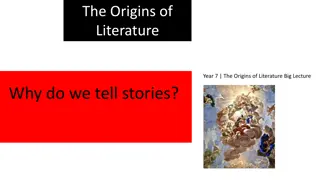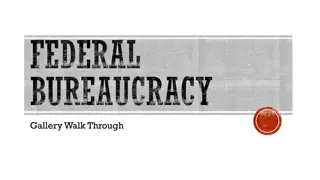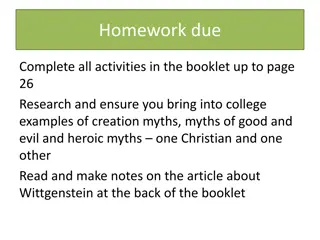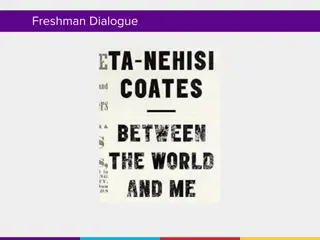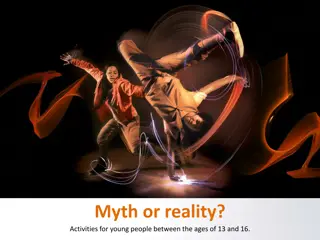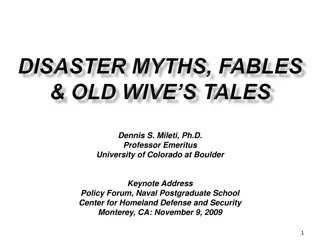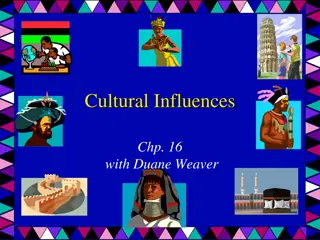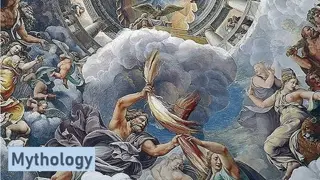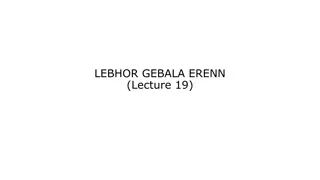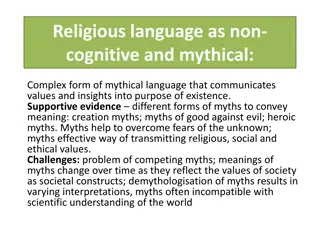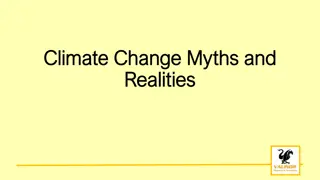The Bureaucracy: Myths, Realities, and History
Delve into the intricacies of bureaucracy through a comprehensive exploration of its myths, realities, and historical evolution. Discover the structure, functions, and challenges faced by bureaucratic systems, while gaining insights into the civil service, merit principle, and the dynamics of government employment. Uncover the truth behind common misconceptions and learn about the complex nature of bureaucratic organizations.
Download Presentation

Please find below an Image/Link to download the presentation.
The content on the website is provided AS IS for your information and personal use only. It may not be sold, licensed, or shared on other websites without obtaining consent from the author.If you encounter any issues during the download, it is possible that the publisher has removed the file from their server.
You are allowed to download the files provided on this website for personal or commercial use, subject to the condition that they are used lawfully. All files are the property of their respective owners.
The content on the website is provided AS IS for your information and personal use only. It may not be sold, licensed, or shared on other websites without obtaining consent from the author.
E N D
Presentation Transcript
The Bureaucracy The real government!
FCC 1978 ruling in FCC v Pacifica Foundation= FCC can police indecency wardrobe malfunction case = 2004 SuperBowl --CBS fined 550,000 by FCC for indecency https://www.youtube.com/watch?v=Q5OWlw8pwG0 will continue to use all of the authority at its disposal to ensure that the nation s broadcasters fulfill the public interest responsibilities that accompany their use of the public airwaves CBS Corporation V FCC FCC v Fox Television Stations = fleeting use of 4-letter profanity 2012 decisions came down: not taking on the 1st Amendment Issue, the court said in these specific cases the FCC had not given fair notice to the stations that they were cracking down on brief nudity and curse words
Classic conception of bureaucracy (Max Weber)a hierarchical authority structure that use task specialization, operates on the merit principle, and behaves with impersonality Definition: Systemic way of organizing a complex and large administrative structure *responsible for carrying out the day to day tasks *2.8 million people (ish) Red Tape definition: official routine or procedure marked by excessive complexity which results in delay or inaction bureaucratic red tape Initial plans became irretrievably mired in the red tape of building permissions. Bella Pollen
Some Bureaucratic Myths and Realities 1) Americans dislike bureaucrats. *Americans are generally satisfied with bureaucrats. 2)Bureaucracies are growing bigger each year. *Not in the federal bureaucracy 4) Most federal bureaucrats work in Washington, D.C. *Only about 12 percent do 5) Bureaucracies are ineffective, inefficient, and always mired in red tape. *No more so than private businesses
https://blogs.wsj.com/economics/2014/11/07/the- federal-government-now-employs-the-fewest-people- since-1966/
Who They Are and How They Got There *Most demographically representative part of government *Diversity of jobs mirrors the private sector Textbook= page 455
Who They Are and How They Got There Civil Service: From Patronage to Protection Patronage: job given for political reasons Civil Service: system of hiring and promotion based on merit and nonpartisanship, created by the Pendleton Civil Service Act (1883) Merit Principle: entrance exams and promotion ratings to find people with talent and skill Hatch Act: government employees prohibited from active participation in partisan politics **Andrew Jackson= to the victor goes the spoils ***Garfield was shot by disgruntled office seeker therefore= Pendleton Civil Service Act was passed
The Hatch Act 1939: curbs political activities of employees in federal, state, and local government Critics say= What about the 1st Amendment rights?? 2X the Supreme Court said it was constitutional Purpose: * to ensure federal programs are administered in a nonpartisan manner * to protect federal employees from political coercion * to ensure advancement is based on merit not political affiliation
The Plum Book a)Congress publishes a list of top federal jobs ( plums ) that are directly appointed by the president (some need Senate confirmation) b) Often these top officials have difficulty running their agency or dept due to the complexities, routines, Budgets and legal challenges c) Many only stay a few years d) The real power is often in the career civil servants within that dept who know more, have been there longer And will outlast them More and more often presidents have been focusing on personal loyalty and commitment to their programs *example of when it s a problem: George W Bush s nominee to FEMA was the president of the Arabian Horse Association == then Hurricane Katrina happened



